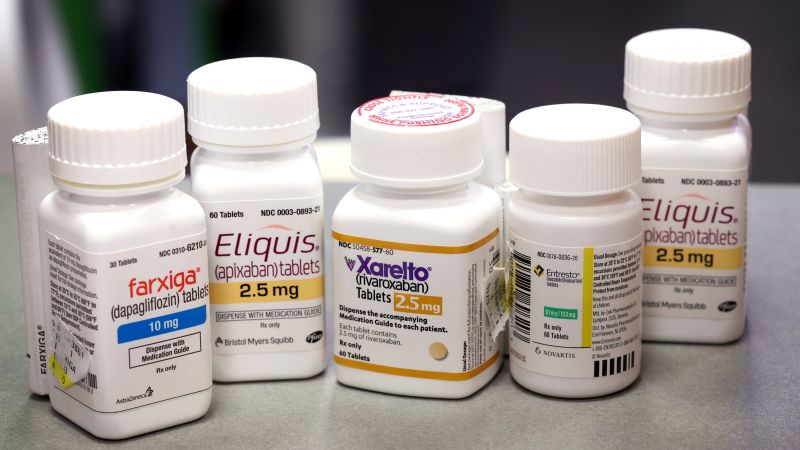
Drugmakers agree to negotiate prices in Medicare even as they sue to stop the program

CNN
—
The manufacturers of the 10 initial drugs chosen for Medicare’s price negotiation program have agreed to participate in the historic initiative, the Biden administration said Tuesday.
However, they are not giving up their efforts to overturn the program in court, even after the industry lost its first legal battle on Friday.
The drugmakers – which include Bristol Myers Squibb, Merck, Johnson & Johnson’s Janssen division, Novo Nordisk and AstraZeneca, among others – will now spend months in talks with the Centers for Medicare and Medicaid Services to determine maximum fair prices for their products.
The agency will publish the agreed-upon prices by September 1, 2024, and those prices will take effect in 2026.
The White House heralded the manufacturers’ participation in the program, which was authorized by the Inflation Reduction Act, which Democrats pushed through Congress last year.
“For decades, Big Pharma fought to block Medicare from directly negotiating lower drug prices for seniors and other Medicare beneficiaries, while nearly three in ten Americans struggle to afford their medications because of cost,” the White House said in a fact sheet. “President Biden and Congressional Democrats finally beat Big Pharma and allowed Medicare to directly negotiate lower drug prices by passing the Inflation Reduction Act – despite zero Republicans voting in favor of the bill.”
But the drug industry is continuing to try to halt the negotiation process. Manufacturers and industry groups have filed multiple lawsuits in federal courts across the US. They each contend that the program is unconstitutional in various ways.
Several said in emailed statements to CNN that they were essentially forced to participate.
“We have no choice other than to sign the ‘agreement,’” a Bristol Myers Squibb spokesperson said. “If we did not sign, we’d be required to pay impossibly high penalties unless we withdraw all of our medicines from Medicare and Medicaid. That is not a real choice.”
Merck said it was signing the agreement “under protest.”
“While we disagree on both legal and policy grounds with the IRA’s new program, withdrawing all of the company’s products from Medicare and Medicaid would have devastating consequences for the millions of Americans who rely on our innovative medicines, and it is not tenable for any manufacturer to abandon nearly half of the U.S. prescription drug market,” the company said.
“The choice between doing so and weathering the IRA’s massive fines and taxes is no choice at all. As we enter this next phase with the government, we remain focused on challenging the constitutionality of the statute in our ongoing litigation,” Merck continued.
It will take time for the lawsuits to wind their way through the courts. An effort to stop the process before the October 1 deadline for the manufacturers to sign the agreements failed Friday when a federal court judge in Ohio denied a request by the US Chamber of Commerce to issue a preliminary injunction.
The Biden administration unveiled in late August the names of the first 10 drugs subject to price negotiations. They are: Eliquis, Jardiance, Xarelto, Januvia, Farxiga, Entresto, Enbrel, Imbruvica and Stelara, as well as Fiasp and certain other insulins made by Novo Nordisk, including NovoLog.
The medications treat heart disease, certain cancers, diabetes and autoimmune diseases, among other conditions.
After this initial round, the Department of Health and Human Services secretary can negotiate another 15 drugs for 2027 and again for 2028. The number rises to 20 drugs a year for 2029 and beyond.
Drugmakers that don’t comply with the process will have to pay an excise tax of up to 95% of the medications’ US sales or pull all their products from the Medicare and Medicaid markets. The pharmaceutical industry contends that the true penalty can be as high as 1,900% of sales.


